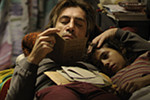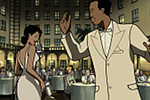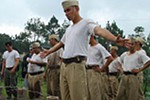 Shadows off the beaten path
Shadows off the beaten pathMY AFTERNOONS WITH MARGUERITTE | RED & WHITE
< < F O R E I G N > >
last update 7.Nov.10
See also: SHADOWS FILM FESTIVAL
 R E V I E W B Y R I C H C L I N E
R E V I E W B Y R I C H C L I N E
prd Fernando Bovaira, Alejandro González Iñárritu, Jon Kilik
scr Alejandro González Iñárritu, Armando Bo, Nicolas Giacobone
with Javier Bardem, Maricel Alvarez, Hanaa Bouchaib, Guillermo Estrella, Eduard Fernandez, Cheikh Ndiaye, Diaryatou Daff, Cheng Taisheng, Lang Sofia Lin, Luo Jin, Ana Wagener, Karra Elejalde
 release Sp 3.Dec.10,
release Sp 3.Dec.10, US 29.Dec.10, UK 11.Jan.11 10/Spain Focus 2h27
CANNES FILM FEST
TORONTO FILM FEST

 While this gentle drama about a man trying to prepare his family for his own death is plaintive and hopeful, the road to the end is both too long and too packed with distracting sidestories.
While this gentle drama about a man trying to prepare his family for his own death is plaintive and hopeful, the road to the end is both too long and too packed with distracting sidestories.
Even before his doctor tells him he has terminal cancer, Uxbal (Bardem) is struggling to manage a team of illegal African immigrants who sell fake designer products made by illegal Chinese immigrants in secret factories. He does this to care for his young children (Bouchaib and Estrella), while his bipolar ex Marambra (Alvarez) works as a prostitute. Meanwhile, Uxbal and his brother Tito (Fernandez) are selling the burial plot of the father they never knew. But this only stirs Uxbal's emotions even further.
While the premise sounds depressing, Inarritu refuses to wallow in misery, focussing on complex relationships and dark irony. It's shot with a striking visual style that blends gritty photography with subtle, chilling effects. And Bardem's performance is full of life. His interaction with other characters is complicated and revealing, and as we watch him grow more haggard and stressed, he somehow develops more of an internal spark, even if it's buried deep inside.
Along the way, strong side stories emerge. A Chinese boss (Cheng) is being manipulated by his gay assistant (Luo). A Senegalese couple (Ndiaye and Daff) is threatened by legal issues. There are also dirty cops and chaotic police raids, plus a preoccupation with death, since one of Uxbal's hidden talents is an ability to communicate beyond the grave. But all of this detracts from Uxbal's already wrenching situation, because the immigration theme threatens to swamp the more intimate, emotional story as the film goes on and on.
By contrast, the scenes of Uxbal trying to prepare his family for the future are earthy, funny and often very touching. We can understand Uxbal's paralysing fear of telling anyone about his illness; not only is there never a good time to deliver this news, but because of Maramba's illness and his own dodgy business the children's future isn't looking very bright. But as he finds inner peace, we see hope for them too.
30.Oct.10
 R E V I E W B Y R I C H C L I N E
R E V I E W B Y R I C H C L I N E
scr Fernando Trueba, Ignacio Martinez de Pison
prd Santi Errando, Cristina Huete, Martin Pope, Michael Rose
voices Eman Xor Ona, Limara Meneses, Mario Guerra, Estrella Morente
musicians Bebo Valdes, Idania Valdes, Freddy Cole, Michael Phillip Mossman, Jimmy Heath, Pedrito Martinez, Amadito Valdes, German Velazco
 release US Sep.10 tff,
release US Sep.10 tff, UK 19.Nov.10
10/Spain 1h34
TORONTO FILM FEST
 Like a soulful Latin song, this beautifully animated film tells a romantic story that's complicated by events over 50 years. The filmmakers both capture the place and time and offer vivid characters we identify with.
Like a soulful Latin song, this beautifully animated film tells a romantic story that's complicated by events over 50 years. The filmmakers both capture the place and time and offer vivid characters we identify with.
In 1948 Havana, talented young pianist Chico (voiced by Ona) is mesmerised by singer Rita (Meneses), and after breaking down her feisty defences, they have a sudden, intense romance. But this is broken up by a woman from Chico's past and an opportunity Rita gets to travel to New York. Over the next five decades, Chico also travels to New York, and their on-off relationship continues as they follow separate career paths. Years later, Chico gets the chance to look for her again.
The story is framed by Chico's life in modern-day Havana, where the Castro revolution has left him as a shoeshiner. He's re-discovered by a Buena Vista Social Club-style documentary crew and real-life singer Morente, which sparks the story's moving final chapter. Rather then focus on the time period, the big social issues or the music itself, the filmmakers put the characters at the heart of the film, which keeps us hugely involved right from the start.
The Latin-infused jazz music is vividly meaningful (along the way we see Dizzy Gillespie, Charlie Parker, Tito Puente and Nat King Cole), but we're drawn in by these complex people who don't always do the right thing. The connection between Chico and Rita is so strong that, even though it looks hopeless, we know they will have to meet again. And again. But with such vivid storytelling, it never feels repetitive.
The animation is simply gorgeous. It's so artful and detailed that it looks like the filmmakers shot the footage before converting it into striking hand-drawn images, reminiscent of Sylvain Chomet's The Illusionist and Richard Linklater's Waking Life. The filmmakers use deep colours and stunning settings add to the texture of the story. And the dark drama is tinged with genuine sensuality and playful humour, plus vivid action sequences. And while the gorgeous song score is an essential part of the film, it's the romance that really gets under the skin.
2.Nov.10
 R E V I E W B Y R I C H C L I N E
R E V I E W B Y R I C H C L I N E MUST
MUST  SEE
La Tête en Friche
SEE
La Tête en Friche
prd Louis Becker
scr Jean Becker, Jean-Loup Dabadie
with Gerard Depardieu, Gisele Casadesus, Sophie Guillemin, Claire Maurier, Anne Le Guernec, Maurane, Jean-Francois Stevenin, Matthieu Dahan, Lyes Salem, Patrick Bouchitey Francois-Xavier Demaison, Melanie Bernier
 release Fr 2.Jun.10,
release Fr 2.Jun.10, UK 12.Nov.10, US 17.Jun.11
10/France StudioCanal 1h32
 Small but perfectly formed, this unassuming French comedy is smart, emotionally engaging and often very funny. Essentially a coming-of-age story about a seemingly dopey middle-aged man, it's also a real charmer.
Small but perfectly formed, this unassuming French comedy is smart, emotionally engaging and often very funny. Essentially a coming-of-age story about a seemingly dopey middle-aged man, it's also a real charmer.
For his whole life, Germain (Depardieu) has been told by his drama-queen mother (Maurier) that he's an idiot. So he has lived up to her expectations. But neighbours in his village loves his kind but bumbling ways. He spends each day at a cafe owned by his friend Francine (Maurane), getting involved in everyone's business. His bus-driver girlfriend (Guillemin) sees his better qualities, and so does Margueritte (Casadesus), a 95-year-old he meets in the park who, while reading books with him, quietly helps him see who he really is.
The filmmakers occasionally give us flickers of Germain's past, with his dismissive young mother (Le Guernec) only very rarely showing any concern for his well-being. These scenes subtly fill in his back-story as we watch this fully grown (perhaps even overgrown) man explore his own intellect in a way he never thought possible. And the most interesting thing is that he doesn't seem to realise he's learning anything; he's just enjoying the rush of curiosity.
Depardieu's acting is so offhanded that it seems like he isn't acting at all. Then we remember that he has also recently played vicious, mercurial gangsters. On the other hand, this is a beautiful depiction of a simple man who is beginning to understand his own complexities as well as some deep truths about those around him. Without ever being flashy, it's an impeccably pure performance. And the supporting cast members interact with him using raw humour and lively energy.
In many ways the film feels like a refreshing slap in the face, jolting us out of the hypnosis induced by bland Hollywood movies. The film simply feels alive to the possibilities around it, unafraid to be cute or heartbreakingly sweet but never becoming remotely sentimental. Filmmaker Becker clearly knows that life is made up of moments that are hilarious and earthy and sometimes painful. And that sometimes it's the difficult things that teach us the most.
22.Sep.10
 R E V I E W B Y R I C H C L I N E
R E V I E W B Y R I C H C L I N E Merah Putih
Merah Putih
scr Conor Allyn, Rob Allyn
prd Conor Allyn, Gary Hayes
with Lukman Sardi, Donny Alamsyah, Darius Sinathrya, T Rifnu Wikana, Zumi Zola, Rahayu Saraswati, Astri Nurdin, Suharto, Anto Galon, Ananda George, Kholig Puspita, Ivan Andriansyah

release Ina 13.Aug.09,
UK 5.Nov.10
09/Indonesia 1h48
 The first part of a trilogy about the independence of Indonesia, with its red and white flag. It's an ambitious and decently made film, but feels pretty simplistic compared to the more complex war movies of the past few decades.
The first part of a trilogy about the independence of Indonesia, with its red and white flag. It's an ambitious and decently made film, but feels pretty simplistic compared to the more complex war movies of the past few decades.
Shortly after Indonesia declared independence in 1945, the Netherlands invaded. As their families were murdered by the Dutch, young men signed up to join the republican army. These include young teacher Amir (Sardi), the farmer Tomas (Alamsyah), rich kid Marius (Sinathrya) and his pal Soerono (Zola). The natural leaders rise through boot camp, but facing the enemy will be a challenge. And indeed, fighting in the trees proves to be seriously difficult as these young men struggle to beat a powerful enemy.
The film is pacey enough to overcome the unsophisticated production values and rah-rah patriotism, which will be lost on non-Indonesians. But the lively dialog and variety of characters help as well, as does an attention to period detail and offhanded humour, which add to the realism. Most interesting is the religious issue, which creates strong tension between Muslims and Christians, who are seen as collaborators.
Non-Indonesians will also have more difficulty identifying with the characters and situations, as social tensions aren't always as clear as they could be and battle sequences kind of blur together indistinctly. This reduces the emotional impact when someone dies and also kind of undermines a sense of their heroism. But then, we've seen enough war movies to understand the tragedy of any young soldier's death.
The second half of the film is essentially a standard war-strategy movie with a handful of plucky soldiers taking on a gigantic enemy apparently with no backup at all. It's pretty awful when any of the principal characters dies, but none of the characters emerges as the focal point, so we don't have that much invested in them. All have personal issues and face moments that require expressions of patriotism and courage. The occasional flashback tries to drum up sympathy for one character or another, but frankly this is the nature of war: senseless loss of life. And the end leaves things hanging for Part 2.
2.Nov.10


See also: SHADOWS FILM FESTIVAL
© 2010 by Rich Cline, Shadows
on the Wall